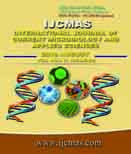


 National Academy of Agricultural Sciences (NAAS)
National Academy of Agricultural Sciences (NAAS)

|
PRINT ISSN : 2319-7692
Online ISSN : 2319-7706 Issues : 12 per year Publisher : Excellent Publishers Email : editorijcmas@gmail.com / submit@ijcmas.com Editor-in-chief: Dr.M.Prakash Index Copernicus ICV 2018: 95.39 NAAS RATING 2020: 5.38 |
From the time unknown, Lepidium sativum, an edible herb, has been recognized as an important medicinal plant. It has also been known to show good galactogogue property. In the present study, mineral profiling and phytochemical analysis of Lepidium seeds have been presented with the aim to recognize its importance as livestock feed. Mineral profiling was carried out with Flame Photometer and Atomic Absorption Spectrophotometer (AAS) and results showed the occurrence of K (11.9 g/kg), Na (1.23 g/kg), Ca (2.91 g/kg), Mg (3.15 g/kg), Zn (0.045 g/kg), Cu (0.006 g/kg), Fe (0.072 g/kg) and Mn (0.031 g/kg). For phytochemical assessment, oil was extracted from the crushed seed powder using soxhlet extraction method and 25.36 % yield was recorded. Further, the phenolic extraction through refluxing of defatted seed powder was done to determine other biochemical contents and yield of phenolic extract was obtained around 20.23 %. Total phenolic content determined through Folin test was 8.53 mg/g of seeds. Crude fibers in seed meal were also estimated to be 23 % in yield. Glucosinolate content was found 89 µmoles/g of seeds. Total flavonoids content was found to be 3.89 mg/g of seeds in phenolic extracts. DPPH (2,2- Diphenyl-1-picryl-hydrazine) free radical scavenging method was used to measure antioxidant activity and IC50 was found to be 21 ppm for methanolic extract. The present studies have revealed that L. sativum seeds have important mineral nutrients, fibers and other essential biochemical constituents and hence considered useful as animal feed and its health.
 |
 |
 |
 |
 |